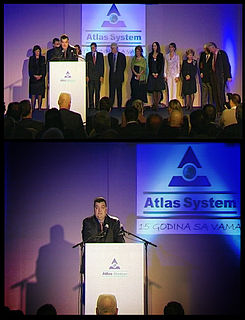Biography
Popović was born on 23 July 1978 in Nikšić, Montenegro. After elementary and secondary education, he continued his education at the Belgrade Faculty of Political Science, University of Belgrade, and in 2003 he received his political science diploma for international relations.
After his studies, on the level of Balkan universities, he was chosen to attend a special pilot program in Belgrade in the domain of "rigid and applied psychology". A year later he became the first profiler in the area of what was then Serbia and Montenegro, being qualified for both descriptive and explicative analysis of human behaviour. When he was 24, he returned to Montenegro and started to work, first in the Ministry of Foreign Affairs, and later as a European Integration counsellor for the mayor of Podgorica, Miomir Mugoša.
Life as an author
In July 2008, he published his novel "Forgotten Mountain", the first fantasy novel about mythical creatures of the Balkans, which became a bestseller in Montenegro and Serbia in only two months.
In November 2008, he received the "Lyre of Orpheus", the first place prose award, on an international literature manifestation organized by the Academy of European Culture, that was held in November 2008, in Sofia and Krumovgrad, Bulgaria. [1]
In February 2009, he received an award for the "Best Book" in an event organised with the goal of promoting individuals and events in 2008 in Montenegro; nine authors received their laureates. Action lasted for a month, and media coverage was done by RTV Atlas.
Popović's essay on Montenegro was published in a specialized edition of National Geographic Traveler - "50 Places of Lifetime" in October 2009. This edition is published once in 10 years and represents one of the most important advertisers of tourism development in the world. Popović's essay brought renown to Montenegro for the fact that the cover page of the magazine was a motif of (Sveti Stefan). Popović was invited because of his success with "Forgotten Mountain" [2]
Early 2010, Popović was awarded author of the year national "Wild Beauty" award by the Montenegrin president Filip Vujanović. His weekly newspaper column "Food for Your Soul", which is published by the "DAN" newspaper, quickly became the most read newspaper column in Montenegro.
Early 2011, the American Comparative Literature Association published a compilation of the most important novelists from Montenegro. Next to three historically renowned names was Milisav Popović. The justification for choosing him was his columns and its unusual content that gained attention beyond Montenegro. The columns soon became widely read, and with a publisher's help, some of them reached an overseas audience. A significant part of his columns was translated by enthusiasts, not certified interpreters. The quality of those translations, and of the columns alone, attracted the attention of specialized literary organizations from the USA. [3]
In June 2011, Popovic was elected as a director of the new National Library in Podgorica, the capital of Montenegro. Mayor Mugosa entrusted him with a mandate for one year to establish a new library system and other cultural offices by European standards "as soon as possible." Up to June 2012, the library recorded a large number of visitors, developed intensive international cooperation, regional connectivity and offer a non-specific attractive facilities. Ambassadors of foreign countries elected Popovic institution for "hot spot for international connection" (a hot spot for good international cooperation). Popovic was named the Best Manager in the culture for the year 2012. In early June 2012, followed by a call from the Mayor, Popovic returned to the cabinet.

Montenegro is a country in Southeastern Europe. It is located on the Adriatic Sea and is a part of the Balkans, sharing borders with Serbia to the northeast, Bosnia and Herzegovina to the north and west, Kosovo to the east, Albania to the southeast, the Adriatic Sea and Croatia to the southwest, and a maritime boundary with Italy. Podgorica, the capital and largest city, covers 10.4% of Montenegro's territory of 13,812 square kilometres (5,333 sq mi), and is home to roughly 30% of its total population of 621,000.

Podgorica is the capital and largest city of Montenegro.

The Christmas Uprising, also known as the Christmas Rebellion, was a failed uprising in Montenegro led by the Greens in early January 1919. The military leader of the uprising was Krsto Popović and its political leader was Jovan Plamenac.

Miomir Mugoša is a Montenegrin physician and politician. He has been mayor of Podgorica, the capital of Montenegro, from 2000 to 2014. He also served as the president of FK Budućnost Podgorica, main soccer team in Podgorica.

Krsto Popović was an officer of the Montenegrin Army who fought in the Balkan Wars and in the First World War.

Podgorica Airport is an international airport serving the Montenegrin capital of Podgorica and the surrounding region. It is one of two international airports in Montenegro, the other being Tivat Airport. Both are operated by the state-owned company Airports of Montenegro.

Marko Miljanov Popović was a Brda chieftain and Montenegrin general and writer.

In a referendum on 21 May 2006, the people of Montenegro opted to leave the State Union of Serbia and Montenegro. This result was confirmed with a declaration of independence by the Montenegrin parliament on 3 June 2006. It simultaneously requested international recognition and outlined foreign policy goals.
The culture of Montenegro is as pluralistic and diverse as its history and geographical position would suggest. Montenegro's culture has drawn influences mainly from The Serbian Empire, the Byzantine Empire, Ancient Rome, Christianity, the Ottoman Empire, the Republic of Venice, Austria-Hungary, and Yugoslavia.
Montenegro was independent from the late middle ages until 1918, when it declared its union with Serbia and, subsequently, became part of various incarnations of Yugoslavia and the state union of Serbia and Montenegro. During this time, football in Montenegro was part of the wider Yugoslavian structures. As a result of the Montenegrin independence referendum held on May 21, 2006, Montenegro declared independence two weeks later, on June 3, and formed its own football association.

Dragana Kršenković Brković is a Montenegrin writer.

Evgenije "Đena" Popović GBE was a Montenegrin statesman, journalist, diplomat, writer and editor.

Duško Knežević is the founder and president of the board of directors of Atlas Group Corporation (AGC), a financial group based in Montenegro consisting of companies with interests in banks in Serbia, Cyprus, Russia and Great Britain.

The Moscow Bridge is a pedestrian bridge that spans the river Morača in Podgorica, the capital city of Montenegro.
Filip Kovačević is a Montenegrin author, human rights activist, and university professor.

Stefan Mugoša is a Montenegrin professional footballer who plays as a striker for Korean club Incheon United and the Montenegro national team.

Marinko Pavićević, is a Montenegrin singer, songwriter, guitarist and poet, whose musical style incorporates elements of chanson, pop rock, psychedelic and recital. During his career, Pavićević worked as an editor in Montenegrin RTV and during the decades, he was one of the most influential music producers in Montenegro.

Ivan Vuković is a Montenegrin politician serving as the mayor of Podgorica since 2018. Before taking office, he worked as an Assistant Professor and Vice-Dean for International Cooperation at the Faculty of Political Science in Podgorica.

Radoje Pajović was a Yugoslav and Montenegrin historian who worked at the Institute of History at the University of Montenegro for forty years. Internationally, he has been dubbed "the most prominent historian of the [World War II] period in Montenegro" and one of the most prominent Montenegrin historians in general. He received the "13 July Award" from the Parliament of Montenegro and "19 December Award" from the city of Podgorica, the capital of Montenegro. His most notable works were Kontrarevolucija u Crnoj Gori: četnički i federalistički pokret 1941—1945 [Counterrevolution in Montenegro: The Chetnik and Federalist Movements 1941–1945] published in 1977, Pavle Đurišić: kontroverzni četnički vojvoda [Pavle Đurišić: Controversial Chetnik Duke], first published in 1987 and then supplemented and expanded and re-published in 2005, and Crna Gora kroz istoriju [Montenegro Through History] also published in 2005. He was the author or co-author of 12 books, and the editor of more than twenty. He was among those Montenegrin historians who refused to engage in historical revisionism to rehabilitate the World War II collaborationist Chetniks, despite this being a trend in the 1990s.

Vladimir Leposavić is a Montenegrin lawyer and politician who served as the Minister of Justice and Human and Minority Rights in the Government of Montenegro and the cabinet of Zdravko Krivokapić from 4 December 2020 to 17 June 2021. Prior to this, he was a senior legal advisor of the Metropolitanate of Montenegro and the Littoral and the Serbian Orthodox Church in Montenegro.

















